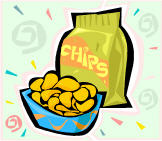 Life is like a box of chocolates. And a credit card is like an open bag of potato chips.
Life is like a box of chocolates. And a credit card is like an open bag of potato chips.I love chips. Potato chips, nacho chips, corn chips. It doesn't matter. Like the ad says, I can't stop at eating just one.
And I've learned something about the way I inhale chips that also can apply to spending money: We need boundaries. In fact, boundaries can be very good.
Eating more than my fill
Here's what I mean. In the past--more often than I care to admit--I've sat down in front of the TV with a half or full bag of chips at my side. I'll begin munching, and before I know it, I'm shoveling the shards at the bottom of the bag into my mouth and feeling a little queasy to my stomach.
However, on occasion, I've caught myself heading to the couch with a chip bag tucked under my arm and stopped dead in my tracks. I then go over to the kitchen cabinet, pull out a medium-sized bowl, fill it to the rim with chips, and put the bag safely back in the pantry. Usually after the bowl is empty, I've satisfied my chip craving, I have a pleasant feeling in my stomach, and have no desire for a refill. (Besides, the kitchen is waaayyy over there...)
Cash surplus
What does this have to do with money? In October, M and I stopped using a credit card to pay for everything. My theory (supported by academic research and financial experts a lot smarter than me) was that making purchases with cash--especially for discretionary expenses, like videos, household stuff, even groceries--would help us stay within our spending plan and manage our money better.
I haven't tallied the final numbers yet but it looks like the theory held true. M and I went over our spending plan at the beginning of the month, paid cash (or used our debit card) for the majority of our non-fixed expenses, and ended up with a modest surplus. We were even able to pay an unexpected $127 for my stepdaughter's tumbling lessons that I forgot to account for in our plan.
Behavior change
What was the difference? Our behavior. With an $18,000 limit, our credit card was the equivalent of a huge, seemingly bottomless bag of potato chips. We never came close to using all of that credit each month, but with such a large boundary, we naturally tended to "consume" more than was really good for us.
Spending within the boundaries of our cash limit--which really, by comparison with our credit limit, is equivalent to a small bowl of chips--made us more focused on how we spent our dollars and used what we purchased. For example, when we ran out of ice cream--another food which, for me, is best served in a bowl--M made up the brownie mix in the cupboard instead of adding it to the weekly grocery list. Thus, we stayed within our shopping budget but still had a tasty dessert.
Many people argue that boundaries are bad. And they can be, if they are unreasonable or too stringent. But use them well and they can save you from feeling a lot of discomfort.
Now, if you'll excuse me, it's November 1. There's a bowl of ice cream with my name on it.



5 comments:
CJ, I really enjoyed this posting. You are really hitting your stride with your writing. Don't eat too much ice cream, Thanksgiving is right around the corner.
Great post! I enjoyed your writing and true to life analysis of the "bowl factor." My wife and I started using cash for many of our expenses and have been able to better control our spending. Once you run out of the cash, that's it folks. I also agree that while boundries can prove essential to corralling spending they can also lead to frustration and anger when one feels too restricted. A healthy balance of boundries and a little flexibility might do the trick.
I use a similar technique to your chip technique, except I look on the bag to see how much a serving is. Then I literally count out that many chips into a bowl, put the bag away, and stop when I finish my serving.
We need a smaller spending bowl, too. What a great analogy.
It's funny--I know this is true for a lot of people, but for me, cash runs through my fingers like water, but a credit card purchase always feels substantial.
Very true. If you spill your bowl of chips, then at the very least you have some chips left from the bag to refill the bowl with. You will not know when an unexpected expense might require your attention, so it's good to have some extra bit of cash from your emergency to lean on.
Post a Comment